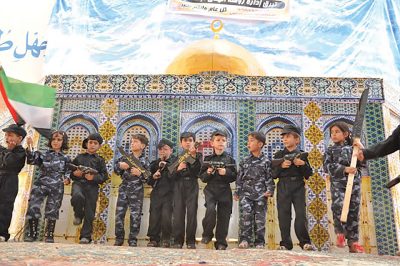×


We have detected your country as:
Please click here to go to the USA website or select another country from the dropdown list.
by: Ilse Strauss, Assistant Editor
August 27, 2014 was a day of great celebration in the Gaza Strip. The day before, a cease-fire agreement signaled the end of seven weeks of fighting between Israel and Hamas, and the terror group ruling the coastal enclave had planned a rally to celebrate the war’s outcome. Throngs of jubilant Gazans—decked out in the green and white of the Hamas flag—lined the streets. Burly Hamas militants brandishing automatic weapons posed for pictures alongside beaming little ones and proud parents.
 Ismail Haniyeh, senior Hamas political leader, held sway over the merriment, rousing the crowd with a passionate boast of conquest in the war that was. “It is not possible to express this victory with words and speeches. The victory is beyond the limits of time and place.”
Ismail Haniyeh, senior Hamas political leader, held sway over the merriment, rousing the crowd with a passionate boast of conquest in the war that was. “It is not possible to express this victory with words and speeches. The victory is beyond the limits of time and place.”
Haniyeh’s swagger and the crowd’s jubilation could easily convince an ignorant onlooker that Hamas had secured a spectacular siege. Yet from any logical point of view, the war did not end well for the terror group. In fact, Haniyeh’s claims of victory echoed through a Gaza that lay in ruins after Hamas embedded its fighters and ammunition in schools, apartments, hospitals and mosques, turning civilian structures into bloody battlefields. The war drew to a close with Hamas’s weapons caches vastly depleted, many of its terror tunnels decimated and the ranks of its military severely diminished—none of which constitutes a glorious triumph. Where was the unprecedented victory of which Haniyeh boasted? And why the joyous celebration in the face of what ultimately constitutes a defeat?
A neighborhood in Cairo bears the rather unexpected title, “6th of October.” The name is no anomaly in Egypt, but rather is honorific, with schools, a bridge over the Nile, a popular restaurant and a weekly magazine proudly carrying the title. Egyptians revere the “6th of October” as a shining symbol of national pride, commemorating the “glorious” surprise attack on Israel that sparked the 1973 Yom Kippur War. However, Egypt hardly emerged from the war as conquerors. In fact, when a cease-fire brought the 20 days of fighting to an end, the Israelis had advanced to within 63 miles (101 km) from Cairo and had the Egyptian army encircled in the desert—neither of which constitutes a glorious triumph. Why then the national pride and the glorification over what ultimately constitutes an Egyptian defeat?
These two examples are not isolated incidents. Contemporary history shows a number of Israel’s enemies doing victory laps in the aftermath of wars, skirmishes and battles—while the statistics clearly spell losses. Are the triumphant claims nothing but desperate attempts by desperate leaders to save face in an honor-centered culture or hide the sorry state of affairs from their people?
Israel Defense Forces (IDF) Col. (Res.) Grisha Yakubovich has a different explanation. According to the former head of the Civilian Department of COGAT—the unit responsible for implementing Israel’s civilian policy and security coordination in the Gaza Strip, Judea and Samaria—victory means different things to different people. In a sense, he explains, victory is like beauty: it is in the eye of the beholder.
 Yakubovich defines a victory as besting your enemy. Triumph, he holds, entails setting goals, missions and targets—and then accomplishing them. “We consider the 1948 War of Independence a victory.” Israel’s goal was defense and survival. The invading Arab armies also had a goal: annihilating the Jewish state. “We succeeded to defend. They didn’t achieve their goal. We won. They lost.”
Yakubovich defines a victory as besting your enemy. Triumph, he holds, entails setting goals, missions and targets—and then accomplishing them. “We consider the 1948 War of Independence a victory.” Israel’s goal was defense and survival. The invading Arab armies also had a goal: annihilating the Jewish state. “We succeeded to defend. They didn’t achieve their goal. We won. They lost.”
The same holds true for the Six Day War. “Three Arab armies came against us and we not only succeeded to defend, we also won more [land],” regaining the Golan Heights, the Sinai Desert, Jerusalem and Judea and Samaria. Again, Israel secured another victory, while Egypt, Jordan and Syria suffered a crushing defeat.
Then came the 1973 Yom Kippur War. “Each year on October 6, Egypt celebrates victory,” Yakubovich says. Yet the war came to an end without Egypt achieving any strategic goals or gaining territory. “So what is the victory?”
“The Egyptians succeeded in surprising us,” Yakubovich explains. “They succeeded in crossing our lines of defense and inflicting many casualties. They showed the Arab world that Israel isn’t invincible. That’s the victory they celebrate.”
The fact that Israel managed to turn the tide and beat Egypt back to within a stone’s throw from its capital and managed to surround its hapless army in the desert matters little to the Egyptian narrative. “In your logic it is important, but it doesn’t count for them. Victory is truly in the eye of the beholder.”
Grasping Hamas’s take on victory entails a broader understanding of the terror group’s narrative. The 1988 Hamas Charter highlights the destruction of Israel as one of its main purposes and calls for jihad (holy war) to “raise the banner of Allah over every inch of Palestine.” However, the terror group is aware of its weaknesses, Yakubovich holds. “They know they aren’t equal to the IDF.” Their strategy is thus to twist Israel’s strengths—restraint and morality—into weaknesses to create a David-versus-Goliath victory narrative.
Yakubovich explains: “It’s easy to look at pictures of [Hamas leader] Haniyeh standing in the bombed rubble of Gaza flashing the victory sign after the 2014 war and wonder: ‘2,200 killed; 12,000 injured. No water. No electricity. What did you win, Haniyeh? You brought disaster on your people.’ But for Hamas, if they succeeded to stand against the strongest military in the Middle East for 52 days and launch mortar shells to the last second, they won. Remember, victory is in the eye of the beholder.”
Yakubovich offers another example. The IDF possess cutting-edge weapons, technology and inventions, yet Hamas exploits this asset to argue: “With all your might and power, look at the damage we can inflict with something as simple as kites and balloons.”
This line of argument makes no strategic sense, he concedes. “So, you burned our fields? We still exist. We’re still among the best in water, hi-tech and health technology. Our economy is still booming.” The fields have been replanted, and in the big picture, what does it matter? However, for Hamas, this counts as a triumph—small and seemingly insignificant, but a triumph nonetheless. Moreover, Yakubovich continues, Hamas weaves all these strands of small victories together into a larger and potentially fatal narrative.
Every time Hamas scores what it sees as a win, every time it achieves what it believes to be a conquest, it reinforces the narrative that violence is the only way to victory and terror the only way to triumph, warns Yakubovich. “If we don’t face this, we will have to deal with a monster in 20 years’ time.”
All logos and trademarks in this site are property of their respective owner. All other materials are property of Bridges for Peace. Copyright © 2025.
Website Site Design by J-Town Internet Services Ltd. - Based in Jerusalem and Serving the World.